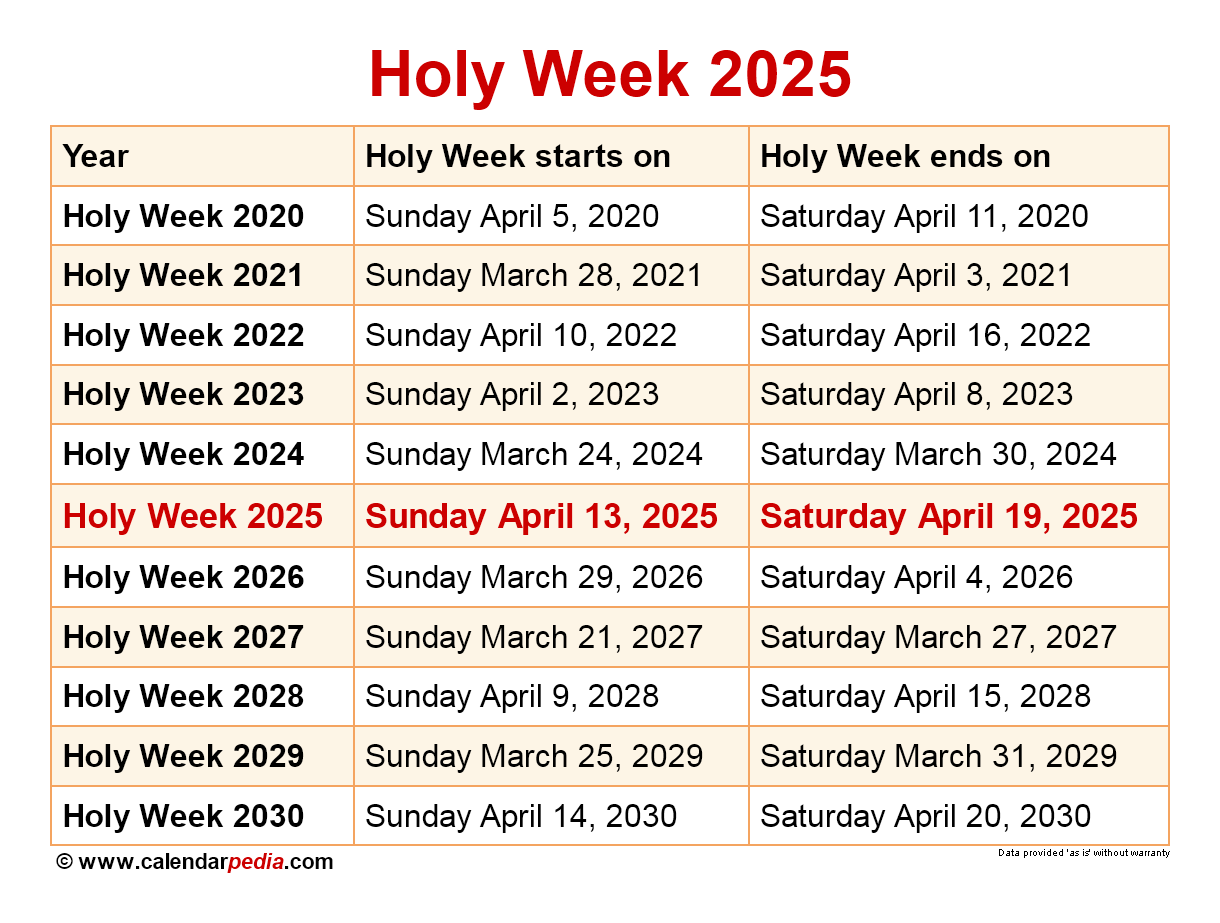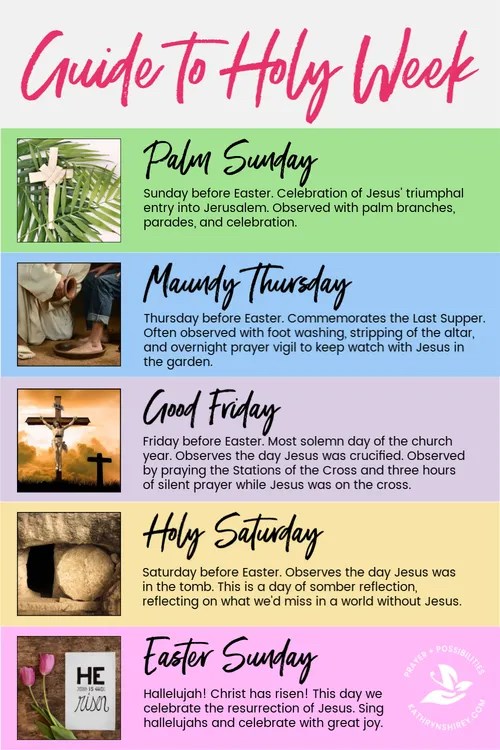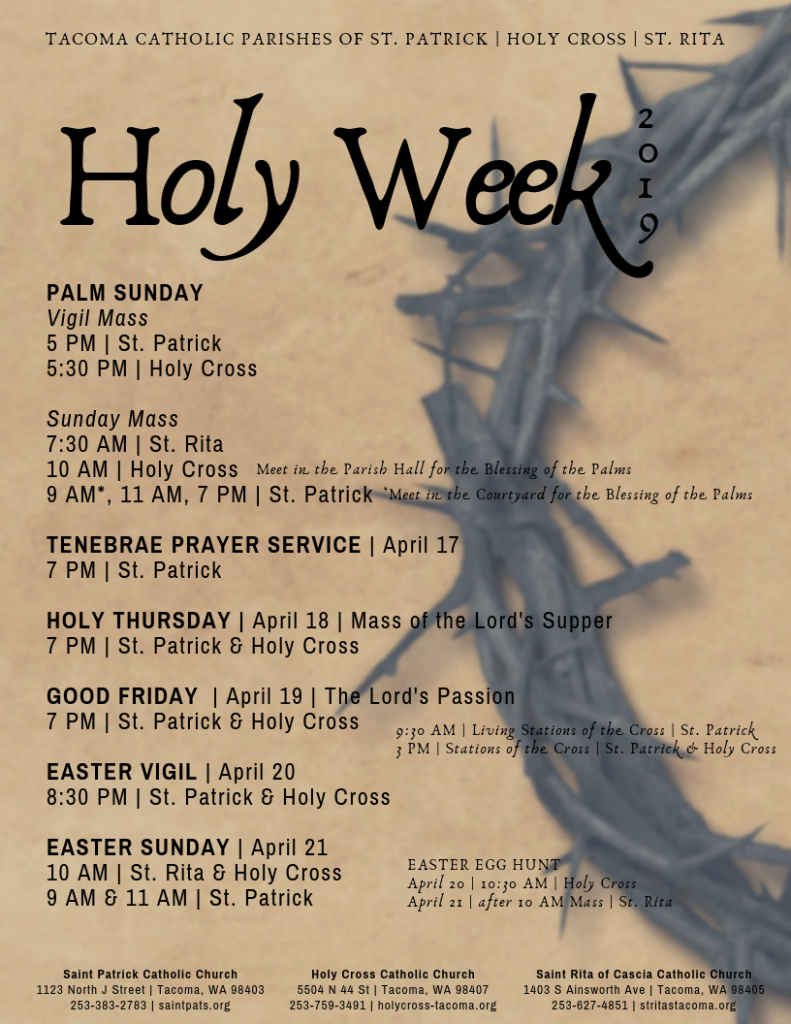Holy Week 2025: A Journey Of Reflection And Renewal
Holy Week 2025: A Journey of Reflection and Renewal
Related Articles: Holy Week 2025: A Journey of Reflection and Renewal
Introduction
With enthusiasm, let’s navigate through the intriguing topic related to Holy Week 2025: A Journey of Reflection and Renewal. Let’s weave interesting information and offer fresh perspectives to the readers.
Table of Content
Holy Week 2025: A Journey of Reflection and Renewal

Holy Week, the week preceding Easter Sunday, is a pivotal period in the Christian calendar, commemorating the final days of Jesus Christ’s earthly ministry, culminating in his crucifixion and resurrection. In 2025, Holy Week will fall between April 13th and April 20th. This period offers a profound opportunity for reflection, spiritual renewal, and a deeper understanding of the core tenets of Christian faith.
The Significance of Holy Week
Holy Week is a time of intense spiritual focus, marked by solemn observances and poignant rituals. It invites Christians to delve into the narrative of Jesus’ passion, death, and resurrection, engaging with its profound implications for their faith and lives. This week’s events offer a powerful reminder of God’s love, sacrifice, and ultimate victory over death.
Observances and Rituals of Holy Week
The observance of Holy Week varies across Christian denominations, but common elements include:
- Palm Sunday: Commemorating Jesus’ triumphant entry into Jerusalem, marked by the procession of palm branches, signifying victory and peace.
- Holy Monday and Tuesday: These days focus on Jesus’ teaching and actions in the temple, including the cleansing of the temple and the parable of the fig tree, highlighting his commitment to justice and righteousness.
- Holy Wednesday: This day commemorates Jesus’ betrayal by Judas Iscariot and his anointing by Mary Magdalene, emphasizing the theme of betrayal and the importance of love and compassion.
- Maundy Thursday: This day marks the Last Supper, where Jesus instituted the sacrament of Holy Communion, symbolizing his sacrifice and the covenant between God and humanity.
- Good Friday: This solemn day observes the crucifixion and death of Jesus Christ, highlighting the ultimate sacrifice made for the redemption of humanity.
- Holy Saturday: This day is a period of somber reflection and anticipation, a time to contemplate the significance of Jesus’ sacrifice and the promise of resurrection.
- Easter Sunday: This day celebrates the resurrection of Jesus Christ, signifying victory over death and the promise of eternal life.
The Importance of Holy Week in Contemporary Life
In today’s world, where life often moves at a frenetic pace, Holy Week provides a valuable opportunity for reflection and introspection. It invites individuals to:
- Contemplate the human condition: The events of Holy Week resonate with universal human experiences of suffering, loss, and the yearning for redemption.
- Cultivate empathy and compassion: The story of Jesus’ sacrifice fosters empathy for the suffering of others and inspires acts of kindness and compassion.
- Seek forgiveness and reconciliation: Holy Week offers a space for introspection and reconciliation, prompting individuals to seek forgiveness and mend broken relationships.
- Embrace hope and renewal: The promise of resurrection offers hope and renewal, reminding individuals that even in the face of adversity, there is always the possibility of new beginnings.
Frequently Asked Questions about Holy Week
Q: What is the significance of Palm Sunday?
A: Palm Sunday marks Jesus’ triumphant entry into Jerusalem, where he was welcomed by crowds waving palm branches, signifying victory and peace. This event foreshadows his role as the Messiah, the King who would bring salvation to humanity.
Q: Why is Good Friday called "Good Friday"?
A: While the day commemorates a tragic event, the term "Good Friday" reflects the belief that Jesus’ sacrifice on the cross was a necessary act of love and redemption, ultimately bringing about salvation for humanity.
Q: What is the significance of Holy Communion during Holy Week?
A: Holy Communion, celebrated on Maundy Thursday, symbolizes the sacrifice of Jesus Christ and the covenant between God and humanity. It is a reminder of his love and the promise of eternal life.
Q: How can I make the most of Holy Week?
A: The best way to observe Holy Week is to engage with its spiritual meaning through prayer, reflection, and participation in church services. Consider attending special services, reading the biblical accounts of Jesus’ passion, and reflecting on the meaning of his sacrifice in your own life.
Tips for Observing Holy Week
- Attend church services: Participate in special services, such as Palm Sunday processions, Good Friday services, and Easter Sunday celebrations.
- Read the biblical accounts: Engage with the narratives of Jesus’ passion, death, and resurrection in the Gospels.
- Engage in prayer and reflection: Take time each day to reflect on the significance of Holy Week and its relevance to your own life.
- Perform acts of kindness: Express your faith through acts of compassion and service to others.
- Share your faith with others: Talk to friends and family about the meaning of Holy Week and its significance in your life.
Conclusion
Holy Week 2025 provides a unique opportunity for Christians to reflect on the profound narrative of Jesus’ life, death, and resurrection. It is a time to engage with the core tenets of faith, cultivate empathy and compassion, and seek renewal and hope. By actively participating in the observances and rituals of Holy Week, individuals can deepen their spiritual connection and find renewed meaning in their lives.







Closure
Thus, we hope this article has provided valuable insights into Holy Week 2025: A Journey of Reflection and Renewal. We hope you find this article informative and beneficial. See you in our next article!
